#i also knighted him so it’s sir thomas
Text
so my neighbor always ask us to feed his cat while he is away. like yeah no problem, absolutely happy to feed the lil guy.
but y’all he is lucky 1. my ass is allergic to cats
and 2. have dogs that would be more then happy to eat him if he ever came into the wrong yard.
because i would be snatching up this lil baby and bringing him home real quick. this is now our collective cat my guy.
😂😂😂😂😂😂😂😂😂😂😂😂😂😂😂😂😂
i can not walk into that house and not immediately baby talk this cute lil mother fucker. this cat now has more names then even my neighbor knows he has.
i am his mother now.
#cats#i wanna be a cat lady so bad#cute cats#joint custody#his name is tom like “tom and jerry#i also knighted him so it’s sir thomas#my neighbor also pays me in flower bouquets to take care of what is now our cat even though he doesn’t know it’s our cat lol
0 notes
Note
favorite queer retellings/interpretations of arthurian legend
hello anon!
this simple question has a complicated answer if only bc some authors seem to have created queer stories unintentionally! & i like them! i'll include quotes from my suggestions below a cut as there will be some mild spoilers but that may help you decide what stories suit your tastes as they vary a lot. you can also just go ahead & assume kay & agravaine are always queer (bc they are, not accepting crit) which makes narrowing down the list difficult for me.
TL;DR: Camelot 3000 Mike W. Barr & Brian Bolland, Exiled From Camelot/Trial of Sir Kay/Hunt for Hart Royal by Cherith Baldry, Spear Nicola Griffith, Guinevere/Morgan/Morgawse by Lavinia Collins, The Queen's Knight by Marvin Borowsky, Arthur Rex by Thomas Berger, The Road to Avalon by Joan Wolf.
Camelot 3000 by Mike W. Barr & Brian Bolland: reincarnation story with transman sir tristan coming to terms with his gender & sexuality so he can accept isolde's love for him & reciprocate. it's really beautifully written imo plus the art is so 80s & my exact cup of tea. it's dated in some of its handling of the subject matter but i think it was done thoughtfully for the time.
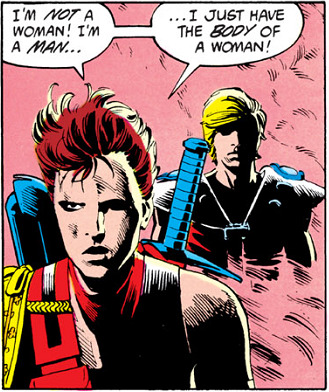
Exiled From Camelot, The Trial of Sir Kay, The Hunt for The Hart Royal by Cherith Baldry: the way baldry writes is overall my favorite ever but her kay is unparalleled he is everything to me. unequivocally disinterested in women (without misogyny, very important note). codependent on gawain if not fully in love with him the crown style. lots of hurt/comfort, kissing, holding & worrying over each other. they exchange a ring for god's sake. in exiled it says ragnelle was the only woman for gawain (based) but after she passed he's all kay's basically so this checks all my boxes. love wins.

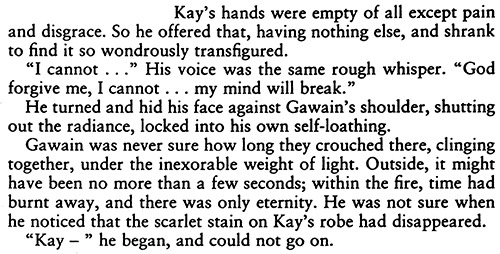

Spear by Nicola Griffith: butch perceval pulling bitches chapter after chapter it's glorious. ends up settling down with nimue. bonus throuple arthur/guin/lance with a very sweet moment with lance talking to percy about them both. no homophobia (external nor internal) to be found its very enjoyable. beautiful prose. audiobook was wonderfully narrated by the author, which is how i read it, thus i've written out a quote here:
"Secrets may prove a burden. So...Lance, my mother is indeed Merlin's sister but I am not Merlin's sister's son."
Lance frowned. "I don't understand..."
"I am not his sister's son."
His eyes stretched wide. He reassessed the line of her jaw, the size of her hands. She nodded. Then he reassessed how she and Nimue sat with one another. This time, Nimue nodded.
Guinevere, Morgan, & Morgawse by Lavinia Collins: these aren't my favorite (did gawain really dirty, deal breaker) but the fact is they have multiple explicitly queer characters including: kay, lancelot, morgawse, agravaine, isolde, dinadan, etc. plus there were several poly scenes including one with guin/lance/kay, another morgawse/lot/visiting king/queen swinging. wild all around everyone is sleeping with everyone no character is unaccounted for. be warned these books are extremely graphic in every conceivable way. queer solidarity in the face of homophobia is a theme throughout. kay punches phobic urien & agravaine "saw nothing." shh its fine urien sucks. this hilarious convo between agravaine & morgawse kills me.

The Queen's Knight by Marvin Borowsky: an interesting retelling in which mordred is a grown up warlord right from the outset. he also happens to be queer. mind this came out in the 50s & contains pederasty, but mordred does later have a loving tragic relationship with fellow knight calogrenant (yay crackships<3), which others were aware of & helped conceal (kay, for example). agravaine is also queer, he only joins arthur's forces bc lancelot asks him to & continues to fixate on him for the whole book. typical.

Arthur Rex by Thomas Berger: so this book is super homophobic. but it's so homophobic that it circles back around to being pretty queer bc berger saw queerness everywhere, apparently. but the green knight is purposefully queer, so the kissing game's gender-role-reversal/bisexuality....escalates. david lowery wishes. both gawain & arthur are pretty homoromantic with lancelot to the point the narrative calls attention to it & then no-homos their closeness. agravaine appears to be queer too. he's the only unmarried brother (claims to be in love with guinevere but i don't buy it), he wants lancelot so bad he gets all tongue tied & stupid around him...wrecked.

The Road to Avalon by Joan Wolf: what's this? agravaine again? so in this version, lancelot is named bedwyr (inspired by mary stewart's quadrilogy) but he's lance in all but name. anyway agravaine constantly beefs with guinevere for his attention...& loses. plus it's implied agravaine slept with lamorak before his mother which is hysterical. (my fave crackship is thriving<3) agravaine topples the empire for a much older straight man. it would be funny if it wasn't so sad. let's give it up for problematic jealous slutty queers.

these are just the retellings i have read & liked. there are more on my retellings list but those were suggestions from others i haven't gotten to yet with the exception of dishonorable mention to the winter knight by jes battis. it has gay gawain & his bestie transgirl bi kay in that but the writing style was unbearable to me unfortunately i'm so sorry i just didn't like it. anyway thanks for the ask!
#arthurian legend#arthuriana#arthurian legends#queer#lgbtq#book recommendations#book reccs#sir tristan#queen isolde#sir lancelot#sir kay#sir gawain#sir bertilak#the green knight#sir agravaine#sir mordred#sir bedwyr#sir calogrenant#sir dinadan#queen guinevere#sir perceval#sir percival#nimue#lady of the lake#king arthur#queen morgause#ask#anonymous
92 notes
·
View notes
Text
Ships? But Sir, They're Trains!
It's Valentine's Day, and to celebrate, I thought I'd break my usual streak of not shipping the talking trains together and share the pairings that I like the best! But only of the original 11, and a few other RWS-related friends (and maybe a bonus or two from the TVS).
Also known as: local weirdo decides trains can kiss, but only on Valentine's Day.
Let's get into the ships... er... trains.
Thomas:
Almost chronically single. I'm sorry Thomas, but you're not very good at the dating thing. Maybe Hank if I swallowed my pride and went to watch Season 12 - just because Hank's calm and friendly personality would naturally balance out Thomas. But also because they are the epitome of 'gentle giant' and 'tank engine terror'. Also, Thomas blushes in this episode:

(Sorry for the Season 12 image, but it's the only Season Hank was in!)
Edward:
This engine has options! Or more to the point - this engine has suitors. Not all make sense to the poor engine - but that's the pain of being the one everyone looks up to. I would put him with BoCo, but I must admit I had a phase where I read EdwardxJames fanfics. So... nostalgia wins (that and Edward needs someone with a fiery personality to boost his confidence sometimes, and James needs a cooler head all the time).

(Look at the smile on James' face! He's ecstatic to see his engine.)
Henry:
Bear. The answer is Bear. I'm sorry, but that Hymek has it bad for Henry, and Henry fought for Bear to stay on Sodor. And after the early days when every engine fought, Henry has no interest in getting tangled up with them again, only this time romantically. Besides, the youthful energy and eagerness Bear has will only benefit Henry, who can be a bit of an old grump.
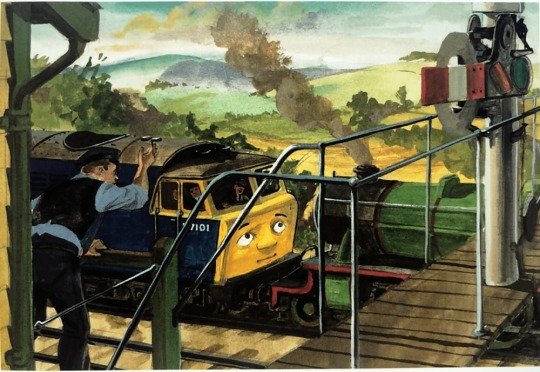
(Bear, I can't tell if you're looking into Henry's eyes or not...)
Gordon:
Hoo boy... Gordon, oh Gordon. What to do with you? Henry and James are taken, Edward and Thomas are more siblings than romantic interests - and engines 6 through 11 are just not close enough. But how about BoCo? (Yes, this is why I didn't pair him up with Edward). BoCo is calm and polite where Gordon is loud and brash - and Gordon does see BoCo as his saviour. It would probably be the plot of a b-list romantic movie, but I can see these two getting together, with Gordon being the jock and BoCo being the 'kid' of Edward.

(Look at that little smile Gordon has! This engine is smitten.)
James:
He's with Edward, thank you. More than that, he doesn't really fit well with the other RWS cast romance-wise. Thomas is something of a rival and friend, while he wants Gordon and Henry to acknowledge him and Percy is something of a little brother/annoyance to James. Edward and he have a lot to work out (mostly James groveling) but they got a lot of coding in the series from what I remember. Plus Edward saved him - so we've ticked the cliche box.
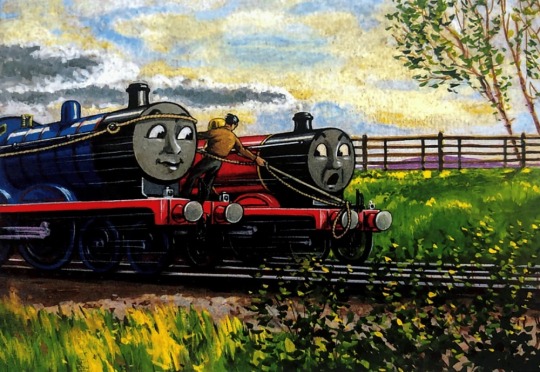
(Yes, this means Edward is the knight in shining armour. James is a diva anyway.)
Percy:
Has about as much luck as Thomas does, if we're honest. Young, childish Percy has no chance, while older, grumpier Percy is more interesting to consider. The Percy of Seasons 5 and 6 I could see bagging Harold. But then, we could also consider the absolute insanity of Percy and Diesel 10. Imagine the shock, imagine the story! (I'm a writer, let me dream about how I'd write this lot). Diesel 10 would be the delinquent who is soft for Percy and Percy only. It would also lead to an epic fight between the helicopter and the engine with a giant claw.

(Um, is Percy... blushing?! What are these faces?! I have questions.)
Toby:
Is married to Henrietta. They are old couple goals. Percy and Thomas are extremely jealous.
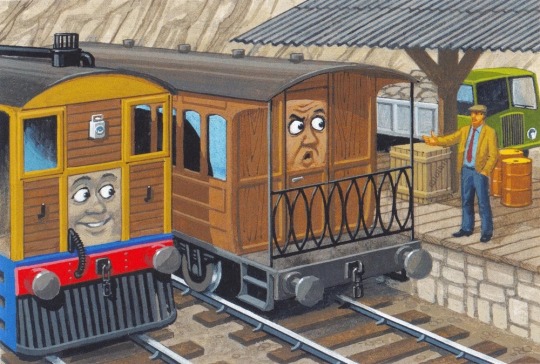
(Toby is grinning cause he knows his wife - that poor manager...)
Duck and Donald:
I considered Percy for Duck, but I feel like what Duck needs is an engine who can really bring out the playful side in Duck - the engine who helps him be more than just the railway he used to work for. That engine is Donald. When they ended up playing pranks on each other in Donald's Duck to the point where Duck stooped to putting a literal duck in Donald's tender knowing Donald would find it funny really says it all about these two.

(Look at him, so excited to play his little prank! His driver is wheezing!)
Douglas and Oliver:
These two practically have a kid in Toad already (or an advice-giving uncle. One of the two). Douglas saved Oliver, and that sort of thing has a lasting impact - especially because it's also the most likely relationship to actually happen. Both Douglas and Oliver are known for sticking it to authority, being a bit hot-headed and being led a bit more by spirit and the heart than by their heads. They have Toad for critical thinking. They live and work together too - and it would be hilarious to watch Duck blast his safety valve off when he finds out.
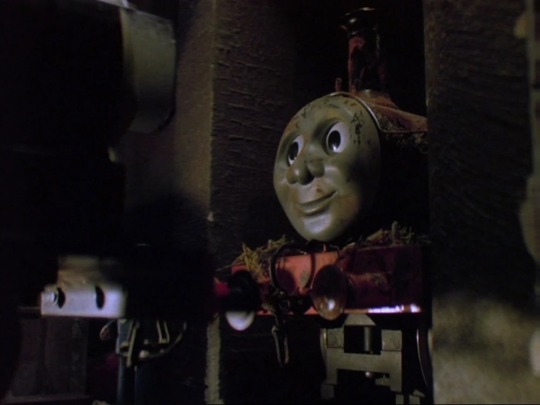
(Ah yes, let me just stare into your eyes for half an episode.)
Mavis and Daisy:
These two are disaster lesbians, and we love them for it. It's also the femme fatale (or as femme fatale as a diesel railcar can be) and the butch (she works in a quarry - this girl wears overalls) tropes - and they're disasters. Need I remind anyone that Daisy was the one who encouraged Mavis to ignore Toby? It would also be hilarious purely for how much Thomas and Percy would grumble about being single, while Daisy and Mavis rub their relationship in the pair's faces. Which would lead to that one memorable incident where Thomas tried to flirt with a very unamused and confused Bertie.
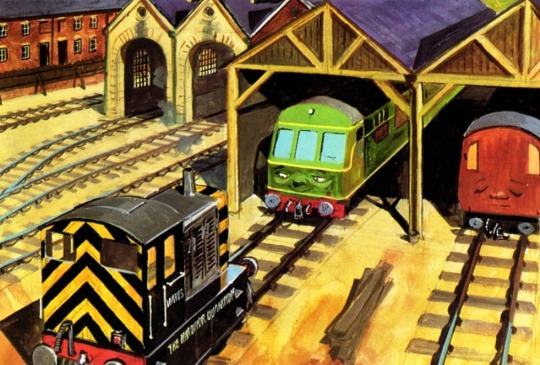
(Mavis, sweetie - don't listen to Daisy's advice. I know you're distracted but ple-- and she's gone.)
Annie and Clarabel:
Are wine aunts and siblings. And no, neither of them are interested in Thomas, so you can stop thinking that.

(These coaches are Thomas' wine aunts and best friends - and he loves them too.)
Bill and Ben:
Are children! Edward's children! That he has with BoCo (sort of) leading to the brilliant moments where Gordon has to 'babysit' them - which is mostly done with a lot of grimacing and begging BoCo to just hand this lot over to Edward and James - no seriously, please stop letting these two just randomly adopt you as their parent. They're evil, and they wanted to throw me in the sea, remember? No, I don't care that James doesn't like them, I don't like them! BoCo!
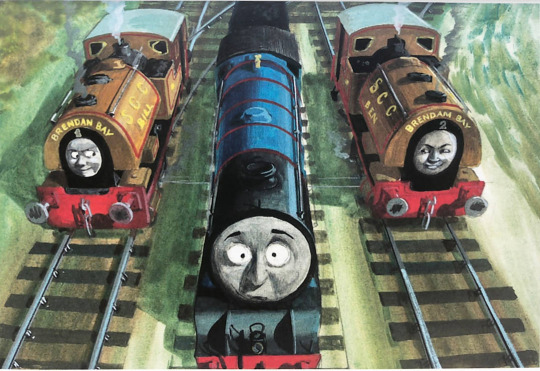
(He's petrified of them, but he wants to be nice for BoCo's sake...)
Emily:
Does not need a man, thank you. But she is entranced sometimes by Caitlin's streamlining (yes, I have seen some CGI - I am not a true purist, I am sorry Awdry). Then again, sometimes Emily likes Hiro - and then there was that one time where she was just so upset that Mavis wouldn't notice her. Emily doesn't need no man - but she's also not exactly got the best selection of potential candidates at her shed...

(She's got an amazing poker face. Caitlin however...)
So... that was a thing I did. Somewhere around Percy's entry, this gained a coherent plot in my mind - probably a High School AU? - and now I'm just thinking of Diesel 10 towering over Percy, blushing and trying to give him flowers (with his claw???) while Harold seethes. Clearly, being a single pringle has driven me insane.
Happy Valentine's Day to everyone, I hope you enjoyed this wild idea and if people want expansions on these ships (still trains) and why I like the idea of them, please go ahead and ask!
If people really like this, I will take on the Narrow Gauge engines.
#weirdowithaquill#railway series#thomas the tank engine#ttte relationships#edward x james#ttte henry x bear#ttte gordon x boco#ttte percy x diesel 10#somehow that made sense in my mind#toby x henrietta#ttte duck x donald#ttte oliver x douglas#ttte mavis x daisy#valentines day#ttte characters#yes this is unusual for me#but i did it anyway#haters will get banished to the shadow realm
60 notes
·
View notes
Text
Twelfth-cake and riddles on HMS Erebus

A Twelfth Night celebration illustrated by Robert Seymour from The Book of Christmas (1836) by Thomas Kibble Hervey – note the cake in the left part of the picture and the cards in people's hands.
In his entry for January 6th, 1841 in his Antarctic-journal-slash-autobiography, Robert McCormick (who was surgeon on the Erebus on the Antarctic expedition) makes this reference to a Twelfth-cake eaten by the officers:
Wednesday, 6th. — Being Twelfth-night, all the officers took tea in the cabin with Captain Ross, and partook of a Twelfth-cake, which had been given him in a tin case, and was to have been opened on the 6th of January, 1840, but had been reserved for entering the ice. It was accompanied by the customary painted figures on paper and sugar, with enigmas to solve, which afforded us all some amusement and laughter; to aid which we had a glass of cherry brandy each.
(The age of the cake always surprised me a little, but apparently, according to the 19th century Cassell’s Dictionary of Cookery, fruit cake “will improve with keeping – indeed, confectioners do not use their cakes until they have been made some months; and if a cake is cut into soon after it is made it will crumble.” (x))
I had no idea that “painted figures on paper and sugar” were a customary part of the Twelfth-cake tradition, so I had a poke around the web and was delighted to learn that Twelfth-cakes came with various figurines for decoration. They were made from moulded sugar paste, with some depicting people, some not.
In the Every-Day Book of William Hone (1827), Twelfth-cakes are described as decorated with “Stars, castles, kings, cottages, dragons, trees, fish, palaces, cats, dogs, churches, lions, milkmaids, knights, serpents, and innumerable other forms, in snow-white confectionery, painted with variegated colours”.


An advertisement for “well executed Twelfth-Night characters”, 1842 (The Australian). Queen Victoria’s Twelfth-cake, 1849 (ILN).
The Twelfth-cakes themselves were generally large, domed, and heavy, full of nuts, dried fruits, and spices. Hone, again, calls them “Dark with citron and plums and heavy as gold”. (A recipe from 1802 is available here, and one from 1830 here – the latter promises a cake 12-14 inches across.)
You could also buy sets of cards with Twelfth Night figures and riddles on them, which were sold in packs. In the late 18th century, it was customary for the party to draw lots with the cards – and whichever character a person was assigned, they would have to play until midnight.


An extant pack of Park's Twelfth-Night characters, 1843. (The Puzzle Museum)
The resolution on these is only just about legible, but here's a close-up of four of them and their solutions from the sheet:
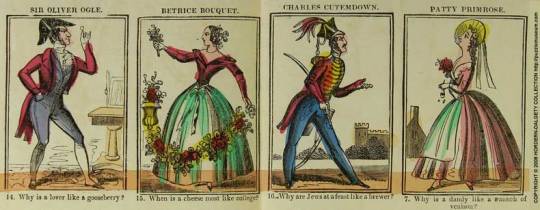
Transcriptions: From left to right: SIR OLIVER OGLE. Why is a lover like a gooseberry? BETRICE BOUQUET. When is a cheese most like college? CHARLES CUTEMDOWN. Why are Jews at a feast like a brewer? PATTY PRIMROSE. Why is a dandy like a haunch of venison?
Solutions: He is easily made a fool of. / When it is eaten. [Eton] / He brews [Hebrews] drink here. / He is a bit of a buck.
———
Sources:
The Puzzle Museum https://www.puzzlemuseum.com/month/picm08/2008-04-parks.htm
The Dickens Museum blog https://dickensmuseum.com/blogs/charles-dickens-museum/dickens-and-the-spirit-of-twelfth-cake-past-by-pen-vogler
Elizabeth Gaskell House blog https://elizabethgaskellhouse.co.uk/twelfth-night-cakes/
Sydney Living Museums blog https://blogs.sydneylivingmuseums.com.au/cook/let-them-eat-fruit-cake/
Foods of England blog http://www.foodsofengland.co.uk/twelfthcake.htm
Primary sources:
Hone, William, The Every-Day Book (1827) - Project Gutenberg
Kibble Hervey, Thomas, The Book of Christmas (1836) - Project Gutenberg
Kitchiner, William, The Cook's Oracle (1830) - Project Gutenberg
McCormick, Robert, Voyages of Discovery in the Arctic and Antarctic Seas (1884) - Hathi Trust
The Australian, January 8th, 1842 - Trove Newspaper Archive
Illustrated London News, 13th January 1849 - Hathi Trust
#polar exploration#1839 antarctic expedition#james clark ross#robert mccormick#francis crozier#(tangentially)#the terror#(even more tangentially)#19th century#if the formatting or something else in this post breaks - I'M SORRY; i had to do the entire thing on mobile; i am filled with rage#happy twelfth night!#m
69 notes
·
View notes
Text
Hey, do you guys want to hear a story? Let me tell you about the romance between Lancelot and Guinevere, as recounted in Sir Thomas Malory's Le Morte d'Arthur.
So, I thought I knew the basics. I grew up reading modern versions of Arthurian legend that focused on other aspects, but had a general knowledge of the Arthur-Guinever-Lancelot love triangle. It didn't show up too much, but I assumed it was subtext in some other versions. What I picked up was that it was sort of pure, almost an ot3, and not the cause of a lot of problems.
My friends. In this version it is NOT SUBTEXT, it DEFINITELY CAUSED PROBLEMS, and it is WILD. It is a true will-they-won't-they drama fest soap opera romance, and I need to share. So please, come on this journey with me.
[I’m looking at you, Black Sails fandom people. I need you to know that Flint canonically would have read this. He would almost certainly have also grown up hearing these stories. I’m not saying he’s Lancelot coded, but I am saying it's interesting that he would have been aware that was something it was possible to be.]
A couple notes, before we dive in. I am very much just summarizing what happened in the book. The thing is, the book is a million pages long and also in Middle English, and this is just one of many plots, which I think is why it's not more widely known. I will show some excerpts so you can get a feel for the text, but you don’t need to read them to understand the story. I'm referring to a version that is as close to the manuscript as I can find, though with spelling regularized. For real fun, see what the original looked like. Malory purports to be translating part of the French Vulgate cycle, which likely is where the character of Lancelot originates, but in fact he is doing much more than translating, and compiles other stories as well. Point being, when he says “so the French book sayeth” etc, that is the “book” to which he is referring. Because of my lack of knowledge about the language and cultural context, this lecture series from Mythgard Academy was absolutely invaluable to my understanding. I cannot recommend it highly enough. Inevitably, some of the opinions of the prof are reflected here. I do not have it in me to compare the scholarship of various medievalists right now, I just want to tell you about this DRAMA.
Let’s start with a prophecy. When Arthur decides he wishes to marry Guinevere, Merlin advises him to take someone else, because if he takes her, she will betray him with Lancelot and it will destroy his kingdom. All of this is foretold, not only to us, but to Arthur himself. Of course he takes her anyway, and all is doomed from the start.
As we begin the main arc of this story (several books after the prophecy), Lancelot is widely acknowledged to be the best and most renowned knight of Arthur’s court. He is plainly and hopelessly in love with Guinevere, and she loves him in return. Arthur doesn’t have a problem with this - who wouldn’t love Guinevere? This sort of love is socially acceptable, so long as they do not sleep together, which would be treason. Arthur in fact seems to support their love, because it means that Lancelot will be Guinevere’s champion should she need one. This is a role Arthur himself legally cannot fill because he is the king, and so would have to be the judge. Lancelot is indeed a good champion for her, and fights for her when she is wrongly accused of murder.
Lancelot is deeply chivalrous, in a way that seems sincere. This is a great place for a first excerpt, a conversation with a Random Damsel Lancelot has been helping:
‘Now, damosel,’ said Sir Lancelot, ‘will ye any more service of me?’ ‘Nay, sir,’ she said, ‘at this time, but almighty Jesu preserve you wheresoever ye ride or go, for the most courteous knight thou art and meekest unto all ladies and gentlewomen that now liveth. But one thing, sir knight, me thinks ye lack, ye that are a knight wifeless, that ye will not love some maiden or gentlewoman. For I could never hear say that ever ye loved any of no manner of degree, and that is great pity. But it is noised that ye love Queen Guenivere, and that she hath ordained by enchantment that ye shall never love no other but her, nor no other damosel nor lady shall rejoice you; wherefore there be many in this land of high estate and low that make great sorrow.’ ‘Fair damosel,’ said Sir Lancelot, ‘I may not warn* people to speak of me what it pleaseth them; but for to be a wedded man, I think it not; for then I must couch with her, and leave arms and tournaments, battles and adventures. And as for to say to take my pleasance with paramours, that will I refuse, in principal for dread of God. For knights that be adventurous should not be adulterers nor lecherous, for then they be not happy nor fortunate unto the wars; for either they shall be overcome with a simpler knight than they be themselves, or else they shall slay by unhap and their cursedness better men than they be themselves. And so who that useth paramours shall be unhappy, and all thing unhappy that is about them.’
So after doing his Knightly Deeds for this damsel, Lancelot asks if she needs anything else. She says no, but you are lacking one thing, which is the love of a woman. It is rumored that is because Guinevere has through sorcery made you love only her, and that causes all of the women great sorrow. In reply Lancelot makes this speech about how he cannot have a wife or paramour and be a good knight, but everyone thinks it is at least in part because his love is reserved for Guinevere.
Now, throughout the book his chastity DOES notably cause all of the women great sorrow. Everyone wants to sleep with Lancelot. Literally he is kidnapped by the four most beautiful queens other than Guinevere, and they say he has to choose one of them as a lover (not even a wife, a lover) or else die. He says he would rather die, though in the end he escapes. This is just an example, truly it is a recurring problem for him. He is, at one point, tricked into sleeping with a woman with whom he conceives his son Galahad (as was prophesied, it's a long story and the romance is only part of it. It is worth mentioning that something similar happens to Arthur, which is how Mordred is sired.) When Guinevere learns that Lancelot has been with someone else, she is angry and banishes him from the court. They still love each other and eventually reconcile.
So, Lancelot goes on the quest for the holy grail. But he fails, specifically because while he is outwardly dedicated to God, in his private heart he is still dedicated to Guinevere. And so he makes a vow to renounce his love for her, acknowledging that it is beyond measure (beyond what is right, even if they have not technically done anything wrong.) However when he returns to Camelot, he cannot keep this vow, as we see.
Then, as the book saith, Sir Lancelot began to resort unto Queen Guenivere again, and forgot the promise and the perfection that he made in the quest. For, as the book saith, had not Sir Lancelot been in his privy thoughts and in his mind so set inwardly to the Queen as he was in seeming outward to God, there had no knight passed him in the quest of the Sangrail, but ever his thoughts were privily on the Queen. And so they loved together more hotter than they did beforehand, and had many such privy draughts together that many in the court spoke of it, and in especial Sir Agravain, Sir Gawain’s brother, for he was ever open-mouthed. So it befell that Sir Lancelot had many resorts of ladies and damosels that daily resorted unto him to be their champion: in all such matters of right Sir Lancelot applied him daily to do for the pleasure of Our Lord Jesu Christ. And ever as much as he might he withdrew him from the company of Queen Guenivere for to eschew the slander and noise, wherefore the Queen waxed wroth with Sir Lancelot.
He and Guinevere start spending a lot of time alone together, and so there are rumors circulating about them in court. In order to put a stop to the rumors, Lancelot starts paying other women attention and doing more good knightly deeds for them. Guinevere is terribly jealous, but he tells her it's for their own good, and also tells her about the vow he made, and his concern that their love is beyond what is appropriate. She is devastated, and weeping banishes him from the court (again).
Lancelot then rides in a tournament, disguised. (Why? Because this is simply a thing knights do.) To make it an effective disguise he takes the token of a woman, the sleeve of the fair maid of Astolat to wear on his helm. When she discovers that he was only using it for the disguise, and he does not indeed love her, she is so heartbroken that she says if he will not marry her or be her lover, she will die. He refuses, on the grounds that love must not be constrained and should arise from the heart, and offers her a thousand pounds a year instead if she marries anyone else. Properly insulted by this, she does indeed die. She has her body sent in a boat to Camelot, with a letter in her hand, saying that she died of her love for him, that he would not return.
Seeing this, Guinevere reconciles with Lancelot, presumably reassured by the fact that he would let this very beautiful much younger woman die of her love rather than being with her. She insists that from now on he will not fight in disguise, and will openly bear her token.
Then Queen Guenivere sent for Sir Lancelot, and said thus: ‘I warn you that ye ride no more in no jousts nor tournaments but that your kinsmen may know you; and at these jousts that shall be ye shall have of me a sleeve of gold. And I pray you for my sake to force* yourself there, that men may speak you worship. But I charge you as ye will have my love, that ye warn your kinsmen that ye will bear that day the sleeve of gold upon your helmet.’ ‘Madam,’ said Sir Lancelot, ‘it shall be done.’ And either made great joy of other.
It is important to keep in mind that, to this point, there is no textual evidence that they were sleeping together, and a great deal of evidence that it was important to Lancelot that they not cross that line. There is much less evidence that this is important to Guinevere.
So then one fateful day in May, Guinevere goes picnicing with an entourage of knights. They are captured by someone else who is in love with Guinevere, and taken back to his castle, but she manages to send a message to Lancelot. At the castle, she insists that her knights sleep in her bedchamber on the grounds that they were wounded in the battle when she was captured and need tending, but truly she wants them there to keep her captor from raping her.
Lancelot arrives to rescue her, and the person who kidnapped her agrees to give her back in the morning. She tells Lancelot to visit her room in the night. He climbs up to her window, which is barred. They have a heartfelt reunion and she says she wishes he could come in to her. He acquiesces and breaks the bars to get into her room, cutting his hand to the bone to do so. Despite the profusely bleeding wound and the ten other men sleeping in the room, they at last do sleep together, in this passionate blood covered consummation. He sneaks back out and replaces the bars.
In the morning, the man who kidnapped Guinevere comes in and sees blood all over the bed. He accuses her of being unfaithful to the king, saying she lay with one of the knights who had been sleeping in her room. She denies it, but it is very clear that she did sleep with someone who was bleeding.
Lancelot says he will fight to defend her from this accusation, which is right and proper because he is her champion. In this story people take trial by combat and oaths before God very seriously, especially Lancelot. He really does try. So he swears an oath that he will prove with his life that Guinevere did not sleep with one of the wounded knights who lay in her room. This of course is TRUE, but only on a technicality. Lancelot, having slept with her himself the night before, is also the one who defends her honor after. I love this story so much.
Instead of fighting him, the kidnapper takes Lancelot captive. In captivity he encounters ANOTHER damsel who insists that sleep with her in order for her to help him. He refuses, still faithful in his heart to Guinevere. Eventually she settles for him holding and kissing her, which is not across the line of appropriateness apparently, giving us some idea of where that line is drawn. Anyway, Lancelot gets out, fights for Guinevere and wins. There are indications that he feels like he barely dodged a devine bullet.
Guinevere and Lancelot return to Camelot. Finally the rumors about them are true, the deed has been done, but of course nothing appears particularly different as there were already rumors about them. Two knights, Mordred and Agravaine, who have been intriguing against Arthur already, go and tell Arthur that Guinevere is being untrue to him. Here is his response:
‘If it be so,’ said the King, ‘wit you well, he is none other; but I would be loath to begin such a thing but I might have proofs of it. For Sir Lancelot is a hardy knight, and all ye know that he is the best knight among us all; and but if he be taken with the deed he will fight with him that bringeth up the noise, and I know no knight that is able to match him. Therefore, and it be sooth as ye say, I would that he were taken with the deed.’ For as the French book saith, the King was full loath that such a noise should be upon Sir Lancelot and his queen. For the King had a deeming of it; but he would not hear thereof, for Sir Lancelot had done so much for him and for the Queen so many times that, wit you well, the King loved him passingly well.
Arthur says he will not hear of this without proof, because if Lancelot is accused and allowed to fight he would beat anyone. And, it is said that Arthur had some idea of the affair, but would not credit it because Lancelot had done so much for him and Guinevere, and he loved Lancelot greatly.
So, one night when the king is away hunting, the two accusers contrive to catch them in the act, with a group of twelve armed knights. They do find Lancelot in Guinevere’s chamber, but the text is notably, pointedly vague about whether they are actually in bed. In any case, Lancelot asks for a trial. The knights say no, they have caught him and so may kill him. He is Lancelot, so he kills all of them instead, save one (Mordred) whom he leaves wounded. Lancelot flees, intending to return to rescue Guinevere and take her to his own castle to protect her from Arthur’s wrath. He maintains her innocence, and still intends that they will all reconcile.
Guinevere is to be burned at the stake (normal in this situation). Lancelot rescues her from the burning at the last moment, killing a number of knights of the round table. Arthur seems to blame the accusers more than Guinevere and Lancelot (for good reason; keep in mind that the romance is a subplot, there is a great deal of political intrigue going on.) Now a war will begin, whether anyone wants it or not, because of the people Lancelot killed. Lancelot takes Guinevere to his own castle. Battle lines are drawn, and Lancelot and Arthur confront each other in the fighting:
And ever was King Arthur about Sir Lancelot to have slain him, and ever Sir Lancelot suffered him and would not strike again. So Sir Bors encountered with King Arthur; and Sir Bors smote him, and so he alit and drew his sword and said to Sir Lancelot, ‘Sir, shall I make an end of this war?’—for he meant to have slain him. ‘Not so hardy,’ said Sir Lancelot, ‘upon pain of thy head, that thou touch him no more! For I will never see that most noble king that made me knight neither slain nor shamed.’ And therewith Sir Lancelot alit off his horse and took up the King and horsed him again, and said thus: ‘My lord the king, for God’s love, stint this strife, for ye get here no worship and I would do my utterance. But always I forbear you, and ye nor none of yours forbear not me. And therefore, my lord, I pray you remember what I have done in many places, and now am I evil rewarded.’ So when King Arthur was on horseback he looked on Sir Lancelot; then the tears burst out of his eyes, thinking of the great courtesy that was in Sir Lancelot more than in any other man. And therewith the King rode his way and might no longer behold him, saying to himself, ‘Alas, alas, that yet this war began!’
So Arthur tries to slay Lancelot, but Lancelot, the better fighter, refuses to slay him and indeed when Arthur is unhorsed Lancelot forbids that he be slain, and gives him his own horse. Arthur weeps for the honor that is in Lancelot, and laments that the war began.
The pope intervenes and tries to negotiate an end. Lancelot confirms that he is willing to return Guinevere to Arthur, and says he has always been willing to do this and will still defend her honor, but that he does not feel he can do so because Arthur has listened to liars and been misled, and he had more reason to take her away than the accusation of adultery - he does not trust she can be safe in that court, with things as they are.
Eventually they do make a deal, with some assurances, and he surrenders Guinevere to the king. He kisses her openly, says that he will leave, but should she be in danger or ever again accused of being untrue, he will fight for her as he always has. He departs the court forever, to much great sorrow, and returns to his own lands.
The war continues - eventually Mordred seizes the throne, Arthur kills him in battle but is mortally wounded himself and passes to Avalon. Following the king’s death, although her love would no longer be adulterous, Guinevere retires to a convent rather than reuniting with Lancelot. He seeks her out, and this is her reaction:
Sir Lancelot was brought before her; then the Queen said to all those ladies, ‘Through this same man and me hath all this war been wrought, and the death of the most noblest knights of the world; for through our love that we have loved together is my most noble lord slain. Therefore, Sir Lancelot, wit thou well I am set in such a plight to get my soul health; and yet I trust through God’s grace and through His Passion of His wounds wide, that after my death I may have a sight of the blessed face of Christ Jesu, and at Doomsday to sit on His right side;* for as sinful as ever I was, now are saints in heaven. And therefore, Sir Lancelot, I require thee and beseech thee heartily, for all the love that ever was betwixt us, that thou never see me no more in the visage. And I command thee, on God’s behalf, that thou forsake my company; and to thy kingdom look thou turn again, and keep well thy realm from war and wrack. For as well as I have loved thee heretofore, my heart will not serve now to see thee, for through thee and me is the flower of kings and knights destroyed. And therefore go thou to thy realm, and there take ye a wife and live with her with joy and bliss. And I pray thee heartily to pray for me to the everlasting Lord that I may amend my misliving.’ ‘Now, my sweet madam,’ said Sir Lancelot, ‘would ye that I should turn again unto my country, and there to wed a lady? Nay, madam, wit you well, that shall I never do, for I shall never be so false unto you of that I have promised. But the self* destiny that ye have taken you to, I will take me to, for the pleasure of Jesu; and ever for you I cast me specially to pray.
Rather than rejoicing in Lancelot’s presence, Guinevere laments that their love brought about the downfall of the Arthurian court, and the deaths of the knights of the round table and King Arthur. She calls upon Lancelot, by all the love that was ever between them to leave her presence, telling him to marry someone else if he wishes and see her no more. Lancelot replies that he wants no one else, and that he will respect her wishes, but will also renounce the world and join a religious order. He asks Guinevere for a final parting kiss, which she denies him.
When Guinevere lies dying of illness, Lancelot sets out to go to her, having had a vision. She knows of his coming, and prays to die before she sees him, because she cannot bear it. She dies a half hour before he arrives, leaving instruction that he is to tend to her body, and then lay it to rest beside that of her lord King Arthur. Lancelot does this with great sorrow, and after ceases to eat or drink, and within weeks is dead himself.
And there you have it, the love affair that doomed Camelot.
HUGE DISCLAIMER: Any and all mistakes or misinterpretations are my own. This is what I gathered, but I am not a medievalist. I am barely an interested layperson. I’m just a random fic writer who got obsessed with research for a story, and had to share this tragic mess.
#i have a million thoughts about this#and there is a great deal of context that would be helpful#but i this doesnt need to be more than 4k words long so#i may do a followup post if there is interest#but black sails folks#i'm writing a lot of flintmadi convos right now#and vaguely planned to have them talk about this book#as a way to discuss their own situation and values#but i had not actually read it#and it is WAY MORE than i expected#anyway they are going to refer back to it#so i figured i should write it down so i can point at it if readers want to know wtf they are talking about#is there an#arthurian legend#tag?#i purposefully haven't looked i don't go here if there is a here to go#but fuck it that was a lot of work might as well see#anyway there are so many things to dig into here#arthur's role or lack thereof#(the rest of the book has a lot more to do with him)#the treatment of fate and prophesy#the courtly love tradition#how this fits into the arthurian tradition as a whole#and the clear french influence#vs the old celtic stories#also so many fun things about language in general#did you know that paramour is derived basically the same way as paramilitary?#'para' as 'beyond that which is regular'#also in middle english negatives are additive rather than canceling each out out!#fun facts
84 notes
·
View notes
Text
Can you imagine the first time Hob Gadling had a lucid dream of his own volition, before he even knows who Dream is? Because let’s be honest, we’ve all been curious about it, but Hob actually has the time to devote to practicing until he’s good at it. But the first time he does it, I can just imagine him stumbling into the Dreaming, simultaneously confused at what he’s seeing and ecstatic that it actually worked because he’s been trying to lucid dream for months now and he’s finally done it, only to find his Stranger standing in the middle of his dream, asking how the fuck he got there
All Hob can do is shrug because it’s the 1600’s and he doesn’t really understand it himself, all he knows is that his good friend (and fellow knight) Sir Thomas Browne has described being able to control his dreams and Hob was curious (yes, I know the timeline doesn’t work perfectly, sue me). Anyway, Dream desperately wants to end the dream and send Hob back to the Waking, but this is technically Hob’s dream; he’s in control and he doesn’t want to wake up (also not how canon works, sue me again) so they spend the entirety of Hob’s lucid dream wandering around the Dreaming. Cue Dream desperately trying to conceal the fact that this is his realm because he doesn’t want Hob to find out that way (or at all) but his subjects are making it incredibly difficult because they constantly address him as Lord and he has to interrupt them before they finish their sentences (Hob thinks it’s immensely rude, but that’s just his Stranger, isn’t it? This is the early 1600’s, only a decade or two after Dream ditched their date for Will Shaxberd; he’s very careful not to think of any other up-and-coming poets or playwrights, lest his mind conjure any distractions for his Stranger). He’s endlessly fascinated by the Dreaming, though, causing Dream to preen a little (a lot) every time Hob compliments his realm. When Hob wakes up, he remembers all of it, to his great confusion and excitement; he then spends the rest of the century (completely ignoring canon because I don’t want it) perfecting lucid dreaming so he can visit his boyfriend Stranger

#the sandman#sandman netflix#dream of the endless#morpheus#dreamling#hob gadling#neil gaiman#sandman neil gaiman
452 notes
·
View notes
Text
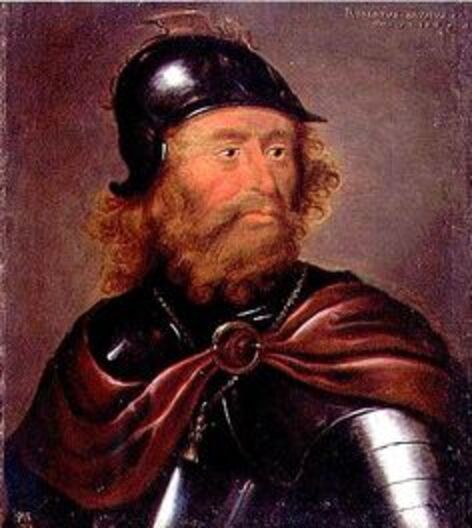
April 9th 1327 saw the death of Walter Stewart, 6th High Steward of Scotland.
You might not have heard of Walter but with the birth of his son Robert the line of Kings and Queens of the Stewarts began, hence this is another kinda long post.
Walter was born at Bathgate Castle, West Lothian, Scotland, the eldest son and heir of James Stewart, 5th High Steward of Scotland by his third wife Giles de Burgh, a daughter of the Irish nobleman Walter de Burgh, 1st Earl of Ulster. This meant he later ended uprelated to King Robert through his second wife Elizabeth de Burgh
At the age of 21 Walter fought against the English at the Battle of Bannockburn in 1314 (based on his suspected birth year of 1296, he would have been only 18 at Bannockburn, so there is something not right there, either the birth year or the age he was at the battle).
Sir Walter the Steward and his cousin James Douglas were knighted on the eve of the Battle of Bannockburn. The Steward had nominal command of a brigade, although, since he was a mere youth, James Douglas was the actual commander, although some sources say he had a major role as a commander, I tend to go with him being taken under the wing of the Good Sir James.
For his services at Bannockburn, Walter was appointed Warden of the Western Marches and was rewarded with a grant of the lands of Largs, which had been forfeited by King John Balliol. In 1316 Stewart donated those lands to Paisley Abbey. Following the liberation of King Robert the Bruce's wife, Elizabeth de Burgh, and daughter, Marjorie, from their long captivity in England in October 1314, Walter the High Steward was sent to receive them at the Anglo-Scottish Border and conduct them back to the Scottish royal court. Soon after, in 1315, he married Marjorie. Who died giving birth to their only son.
Marjorie Bruce's death would be the second death of this nature in their line - her mother Isabella of Mar died giving birth to Marjorie, or shortly after - one child, one death of the mother. Marjorie is said to have died after a fall from horseback, which sent her into labour, in the end dying from childbirth, but it is also said she lived for a few months after the birth, but the truth is lost to time. This would seem to make their son Robert II have as many babies as he could, and he had many, but we will get to him.
During the absence of King Robert the Bruce in Ireland, Walter the High Steward and Sir James Douglas managed government affairs and spent much time defending the Scottish Borders. Upon the capture of Berwick-upon-Tweed from the English in 1318 he took command of the town which subsequently on 24 July 1319 was besieged by King Edward II of England. Several of the siege engines were destroyed by the Scots' garrison whereupon Walter the Steward suddenly rushed in force from the walled town to drive off the enemy. In 1322, with Douglas and Thomas Randolph, he made an attempt to surprise the English king at Byland Abbey, near Malton in Yorkshire, but Edward escaped, pursued towards York by Walter the Steward and 500 horsemen.
He married Isabel de Graham, believed to have been a daughter of Sir John Graham of Abercorn, by whom he had three further children: John Stewart of Ralston. Sir Andrew Stewart, knight. Egidia Stewart, who married three times: firstly to Sir James Lindsay of Crawford Castle; secondly to Sir Hugh Eglinton; and thirdly to Sir James Douglas of Dalkeith.
It's recorded he died after falling ill with a feveron this day 1326 at Bathgate, he was only 30, but was already a much admired warrior of the era.
10 notes
·
View notes
Text
Associations post (Part 2)
(Part 1)
Yes, I went ahead with this one after all. While I was sincerely trying to find "my" Logarius among the sitters on old masterpieces of art, I came across other associations with Bloodborne characters. And most of them were Laurences, because I'm boring and call every cute young man with brown hair a young Laurence LOL
Sorry I will repeat some characters from post to post :( Hope it still will be interesting
BTW
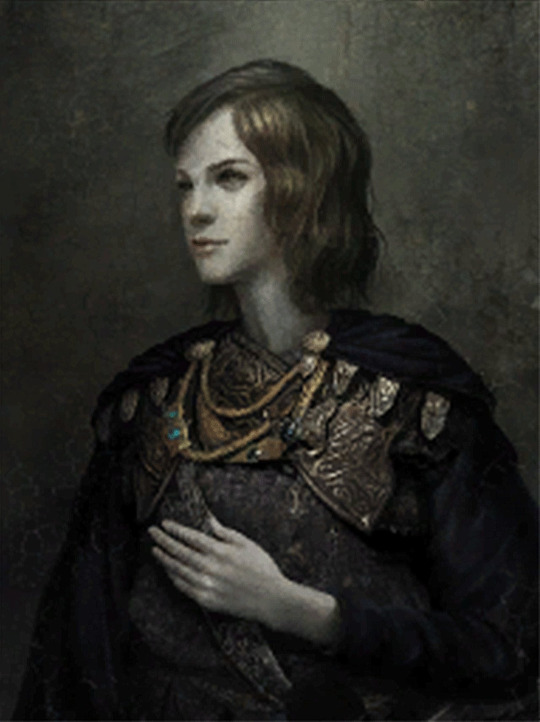
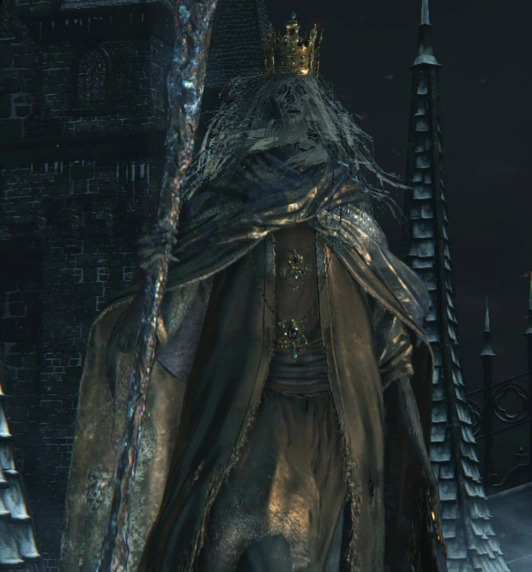
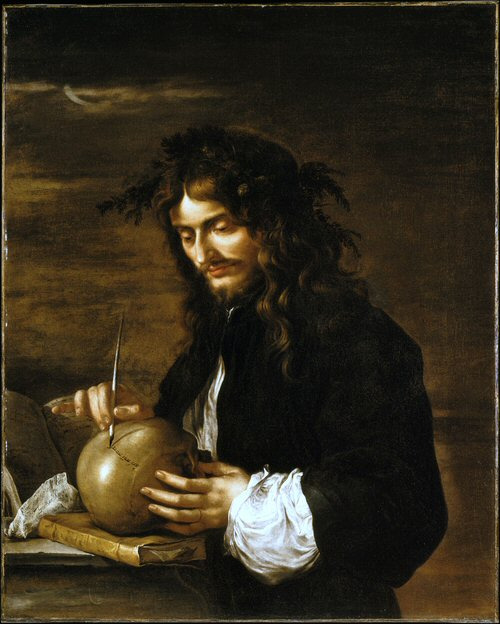
Salvator Rosa, "Autoportrait" for Martyr Logarius before he turned into a bearded pthumerian skeleton.
There is a theory that boy on a painting in a Cainhurst is a King of Cainhurst/or Logarius himself. Good ground for headcanons! As for me, this boy is Rogeriusz's brother, because.... He is a brother of a King! :D Just ALL of his portraits were destroyed because of betrayal. But Rogeriusz and King were like twins! I still struggle with Logarius' backstory, because can't choose which trope for him I like more. I need to FeEl him properly
As for autoportrait, I know that artist has other autoportraits. This one is more idealistic suitable for Logarius. Tho my Rogeriusz is much more brutal and has something wild because he is a fucking ideological maniac and a madman. Just mix knight Mordred and Henry VIII and spirit of Russian revilution = sir Rogeriusz in my interpretation. Ludwig, you have AWFUL taste in men
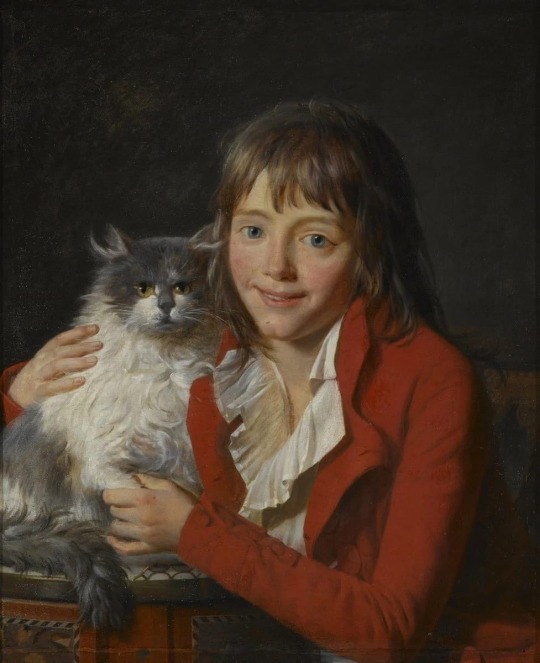
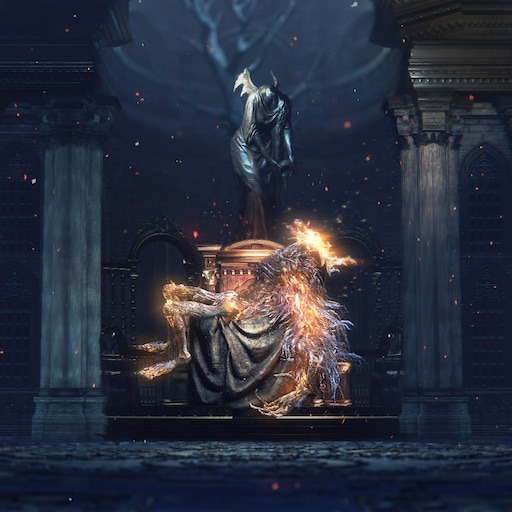
Jean-François Garneray - "Portrait of Ambroise Louis Garneray" for little Laurence. Look at him, just LITERALLY THE WAY I IMAGINE HIM in childhood!!!!!! Kids awwwww Q_Q I still want to draw a few doodles with baby-characters... So sweet and funny in my head......
Look at that boy! ToT He is so happy *_*
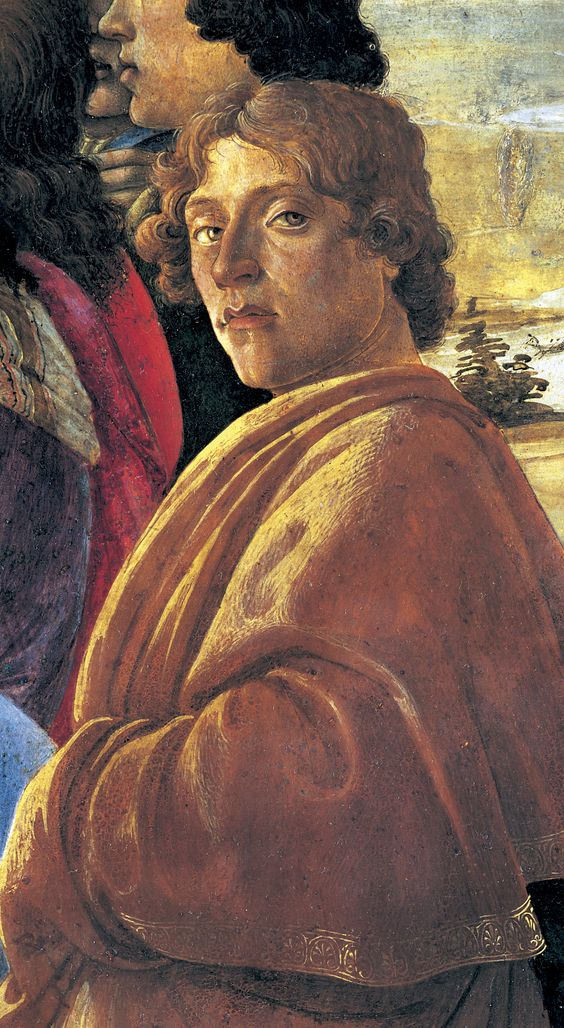
Sandro Botticelli, autoportrait, part of "Adoration of the Magi" for Caryll!
I started drawing as a little child trying to copy and trace faces on his paintings! ;_; Also, his robes here have typical-greek patterns on them, I think those might have been the inspiration for all the patterns on the buildings in Yharnam >:3
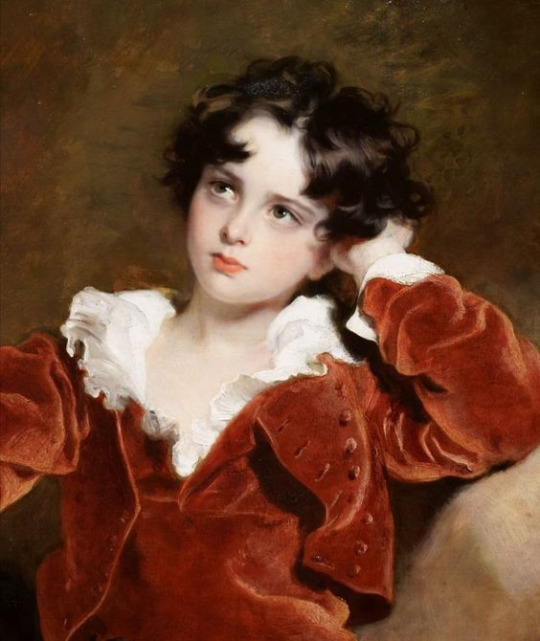

"The Red Boy" by Thomas Lawrence for little Micolash!
Thoughtful, too clever for his young age boy for me fits perfectly for Micolash. I don't think he was born looking delusional lol, just his researches, mania for Kos and ascending changed him, though inside he was always like that (depends on interpretation!)
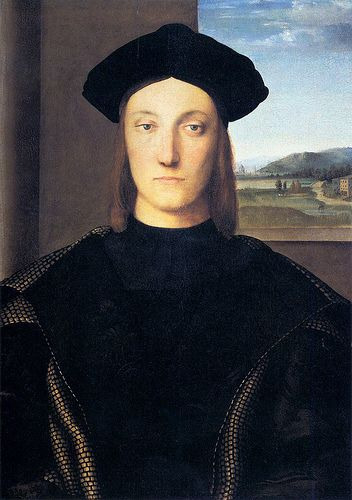
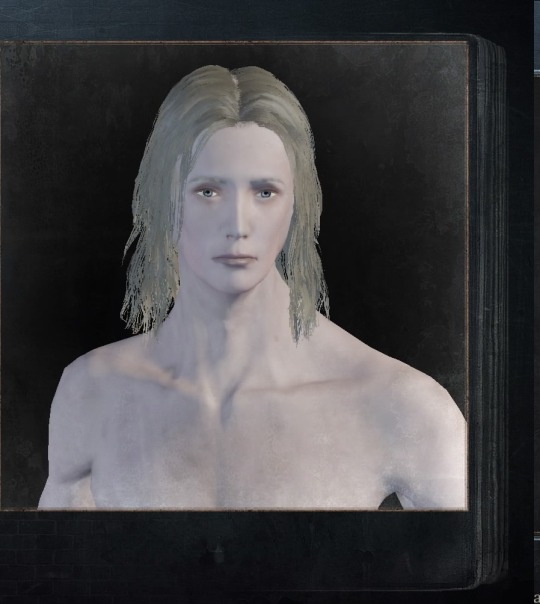
"Guidobaldo da Montefeltro" by Raphael for young Damian!!! In the right is Damian's model just with set "young" instead of "old" and eyebrows. They look like brothers !!!!
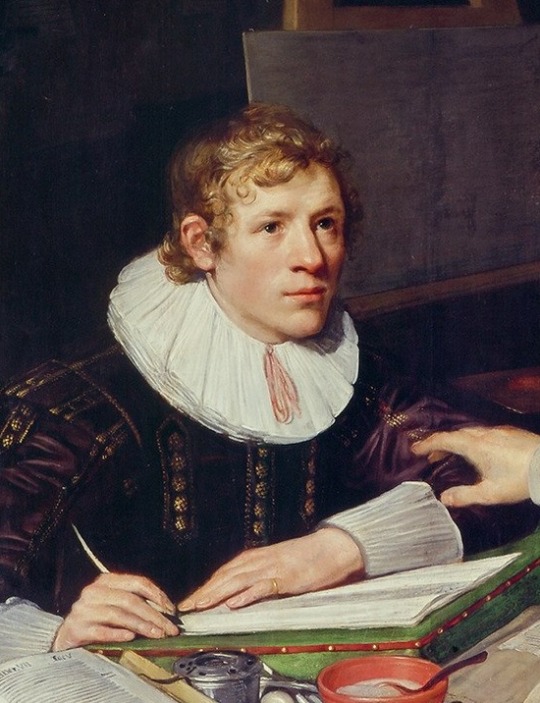
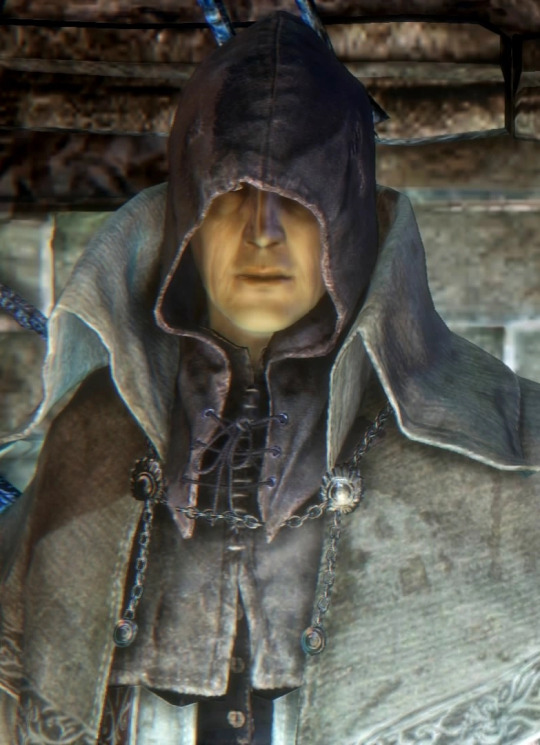
Part of painting by Jan Anthonisz van Ravesteyn "Pieter van Veen, his son Cornelis and his secretary Hendrick Borsman" for Tomb Prospector Olek!!!
Unexpected, hard to explain, but this is Olek :P His data supposes his hair to be brown but.... But.... Mine Olek is blonde.... D: The only compromise is that his hair is brown but on the light it looks like blonde! Profit!
My version of Olek is a child of streets, who eagerly wanted to learn how to read and write, and asked owner of a bookshop to teach him in exchange of protecting his little shop! Olek is a fan of pthumerian history and had a dream to once meet queen Annalise in-person before Cainhurst massacre happened. Also he has opened confrontation with Logarius who found Olek kinda funny. This all goes from the fact that Olek can be found in pthumerian chalices mostly (I don't remember if he is summonable in Loran chalices). I believe that he lost his sanity long ago and continues to travel through catacombs to find Queen Yharnam (he is summonable NPC for her fight)
#bloodborne headcanons#paintings#not finished!#martyr logarius#laurence the first vicar#micolash host of the nightmare#tomb prospector olek#mensis scholar damian#runesmith caryll#art
8 notes
·
View notes
Text
Nicola Walker's appearing in another historical (for the first time in what seems like ages!)
Everything We Know About Mary & George
BY EMILY BURACK PUBLISHED: NOV 16, 2023

Mary & George, a new period drama which will chronicle the affair between King James I and George Villiers, Duke of Buckingham, promises to be one of the most highly anticipated shows of 2024.
In fact, the romance between the two is referenced in Casey McQuiston's Red, White, & Royal Blue novel, wherein the fictional Prince Henry writes, "I feel that James I, who fell madly in love with a very fit and exceptionally dim knight at a tilting match and immediately made him a gentleman of the bedchamber (a real title), would take mercy upon my particular plight." In a fun turn of events, actor Nicholas Galitzine stars as both Henry in Red, White, and Royal Blue and as the "very fit knight," a.k.a. George, Duke of Buckingham.
Here's everything we know about Mary & George so far:
It's based on a true story.
Mary & George is adapted from The King's Assassin by Benjamin Woolley, a nonfiction book that details "the conspiracy to kill King James I by his handsome lover, the Duke of Buckingham."
Per Sky Atlantic, "Mary & George is inspired by the unbelievable true story of Mary Villiers, who moulded her beautiful and charismatic son, George, to seduce King James VI of Scotland and I of England and become his all-powerful lover. Through outrageous scheming, the pair rose from humble beginnings to become the richest, most titled and influential players the English court had ever seen, and the King’s most trusted advisors. And with England’s place on the world stage under threat from a Spanish invasion and rioters taking to the streets to denounce the King, the stakes could not have been higher."
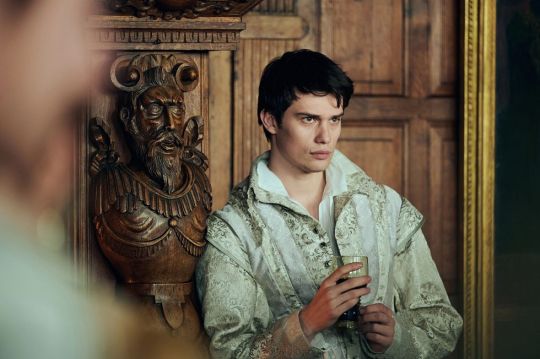
Galitzine is also set to star in Red, White, and Royal Blue this year.SKY AND AMC
The plot continues: "Prepared to stop at nothing and armed with her ruthless political steel, Mary married her way up the ranks, bribed politicians, colluded with criminals and clawed her way into the heart of the Establishment, making it her own. Mary & George is a dangerously daring historical psychodrama about an outrageous mother and son who schemed, seduced, and killed to conquer the court of England and the bed of King James."
Julianne Moore and Nicholas Galitzine lead the cast.

Moore and Galitzine as the mother-son duo.SKY AND AMC
Julianne Moore stars as Mary Villiers, Countess of Buckingham
Nicholas Galitzine stars as George Villiers, 1st Duke of Buckingham
Tony Curran as King James I
Laurie Davidson as Robert Carr, 1st Earl of Somerset
Trine Dyrholm as Queen Anne
Tom Victor as John Villers, 1st Viscount Purbeck
Amelia Gething as Frances Coke, Viscountess Purbeck
Sean Gilder as Sir Thomas Compton
Jacob McCarthy as Christopher "Kit" Villers, 1st Earl of Anglese
Alice Grant as Susan Villers, a.k.a Susan Feilding, Countess of Denbigh
Niamh Algar as Sandie
Nicola Walker as Elizabeth Hatton
Samuel Blenkin as King Charles I
Mirren Mack as Katherine Villiers, Duchess of Buckingham
Rina Mahoney as Laura Ashcattle
Adrian Rawlins as Sir Edward Coke
Simon Russell Beale as Sir George Villiers
There will be seven episodes in the limited series.

Davidson as Earl Somerset, Curran as King James, and Dyrholm as Queen Anne.SKY AND AMC
No premiere date has been set yet, but it will air in 2024 on Sky Atlantic in the UK and Starz in the US. Watch a teaser trailer here:
youtube
It was originally supposed to air on AMC Networks, but now it will air on Starz.
10 notes
·
View notes
Note
Saw your list of wips and I gotta know.... Bruce steals the Declaration of Independence???? What is happening 😂😭 also I'm curious about the merlin shapeshifter WIP and the boy in the asteroid one for atla! Thank you for the crumbs, laughing so hard at the dick snippet you posted from the hinge sequel 😂😂 hope you're having a good one!
Good choices!
Bruce steals the Declaration of Independence: every time I enter a fandom I am legally obligated to devise a National Treasure AU that I will not actually write.
In this one, Bruce does not have a cowl, but he does have a family legacy of treasure hunting. Instead of becoming Batman, he throws himself into finding the lost Knights Templar treasure (as you do) but can't find where the key rests with Charlotte. One day this kid shows up to be like, "Hey, Mr. Wayne, sir, I, uh, I think I found the Charlotte?"
Basically, Bruce is obviously Ben. Tim (15ish) is the Riley character/tech guy. Jason (estranged son #2) works for the Smithsonian and has three hobbies: Doing history the right way and not the treasure hunting way (your boy has degrees for dayz), getting into flame wars about literature on twitter, and making Bruce Thomas Wayne's life as difficult as he possibly can. Dick (estranged son #1) is a police officer who has sworn off history (but gets the Daylights Savings realization). All of them get roped into shenanigans loosely based on National Treasure.
Shapeshifter: ANGST. AU from somewhere after series 4. Merlin believes himself to have been arrested for sorcery by Arthur and kept in a dungeon and treated very, very badly, but then...turns out it wasn't Arthur. Turns out it's a shapeshifter that feeds off power and misery (ie, it came looking for Arthur, found Emrys instead). Thing is, Merlin really thought it was Arthur, so then like 70% of the fic would actually be the fall out from that--Merlin trying to not be afraid of Arthur, who keeps telling himself it wasn't him except for Arthur doesn't know about the magic so what if it's how Arthur will be one day, Arthur trying to figure out if Merlin really trusts him that little, trying to understand how the hell Merlin could believe that Arthur would hurt him or torture him, and just.....no one has a good time at all. Eventual magic reveal and hopeful-ish ending.
Boy in the Asteroid: I had a concept for a atla characters on a Starfleet ship/Star Trek AU but it never came together much beyond this snip:
“Captain’s Log, Stardate 2152.3. Commander Sokka and Lt. Commander Dr. Katara are no longer allowed on solo away missions. I know I’ve said that before, but I mean it this time. I draw the line here.”
Basically, Zuko's the captain, Sokka's his first officer, Katara is the CMO, Toph is head of security. On an away mission, Katara and Sokka accidentally crack open an asteroid and find Aang.
#fic stuff#I wrote a thing#several things actually#I mean it about NT AUs though#it's a sickness#a compulsion#I think Merlin is the only fandom I went deep on where I didn't try and make it work#WIP meme#anonymous#Batfam#Bruce Wayne#Jason Todd#Tim Drake#Dick Grayson#Merlin#Arthur Pendragon#Bitter Merlin Blogging#atla#Sokka#Katara#Zuko#jfc that's so many tags#anyway
24 notes
·
View notes
Text
Summary of Le Morte D'Arthur by Thomas Mallory
Chapter I: How Uther Pendragon sent for the duke of Cornwall and Igraine his wife, and of their departing suddenly again. OR The Time Uther Pendragon started a war because he was horny
When Uther Pendragon was king, he sent for the Duke of Cornwall to come visit him. He invited his wife, Igraine, as well because she was supposed to be hot. When they arrived, they were treated well and Uther decided that Igraine was indeed hot and wanted to sleep with her. Since she was, you know, married, she said no and then told her husband that she was pretty sure they had been invited just so the king could sleep with her. They decided to leave quickly and without telling anyone. This pissed the king off. The king’s advisors told him to summon the Duke and his wife again and if they didn’t come, then he would have a reason to declare war. He sent for them, they obviously didn’t return, and King Uther Pendragon declared war on the Duke of Cornwall, saying he would attack his biggest castle in 40 days time.
The Duke decided to get two of his castles ready for war and put his wife in one while he stayed in the other. Uther attacked the castle that the Duke was in and a lot of people died. The king got such bad blue balls that it was noticeable to his knights and one of his knights, Ulfius, asked him what was up. Uther said he was so in love with Igraine that he’d gotten sick. Ulfius told him that Merlin would help him. Ulfius went off and found Merlin and Merlin said that he’d help as long as he got rewarded. Ulfius said that he was sure the king would reward him, so Merlin agreed to help.
Chapter II. How Uther Pendragon made war on the duke of Cornwall, and how by the mean of Merlin he lay by the duchess and gat Arthur OR How Uther and Merlin are the real villains here
Ulfius brought Uther to Merlin. Merlin told Uther that he’d help him get laid on the condition that he get the child that he had with her. Uther agreed. Merlin told Uther to head to the other castle where Igraine was and that he would look like the Duke to everyone and his knights would look like the Duke’s knights. He said not to talk too much, but to just sleep with her and then stay in bed until he came by in the morning. After Uther left, but before he arrived at the other castle, the Duke was killed.
Uther then slept with Igraine while she thought he was the Duke and impregnated her. The Merlin came by in the morning and Uther left with him. Later, Igraine learned her husband had died at the castle and started wondering who she had slept with then and mourned her now dead husband. With Ulfius as a messenger, it was arranged that Uther and Igraine get married.
King Uther had King Lot marry Margawse who was Sir Gawaine’s mother. He also had King Nentres marry Elaine. They were sisters and the third sister was Morgan Le Fay who he sent to a nunnery where she became a necromancer. Later, she married King Uriens who was Sir Ewain’s father.
Chapter III: Of the birth of King Arthur and of his nurture OR Possibly the least believable bit so far
Eventually it became really obvious Igraine was pregnant and Uther asked who’s kid it was. Igraine was embarrassed, but Uther said he just wanted the truth and wouldn’t judge her for it. Igraine told the story of how someone had impersonated her husband to sleep with her. Uther was like “Yeah, thanks for being truthful. That was me and Merlin told me to do it.” This apparently made Igraine happy, but I’m not sure I believe the author here.
Merlin came by and claimed the kid like he said he would. Merlin gave the kid to Sir Ector, but had Sir Ector come to court for a while while Igraine was still pregnant so that Uther could see that his child would be in good hands. The king gave Sir Ector a bunch of nice stuff for raising his kid for him. When the child was born, he wrapped him in gold and then told some servants to take him to the poor man outside the castle. For some reason they actually did this and it was fine because the poor man was Merlin who then gave the kid to Sir Ector and they christened him Arthur.
Chapter IV: Of the death of King Uther Pendragon
Less than two years later, Uther got sick. His enemies took advantage of his weakness and killed a bunch of his people. Merlin told him to get his ass up and to be taken to the battlefield to be there in person because that was the only way they could win. For some reason, this worked and they won. Uther lost his ability to speak three days later. Merlin said he couldn’t do anything about it because it’s God’s will, but he would make him speak tomorrow. The next morning, Merlin asked him if Arthur would be the next king and Uther replied saying that he would and then immediately died.
Chapter V. How Arthur was chosen king, and of wonders and marvels of a sword taken out of a stone by the said Arthur. Or How Arthur’s brother’s forgetfulness made Arthur king
Obviously this created a power vacuum since Arthur was all of 2 and also no one knew where he was. Merlin made all of the lords and gentlemen of arms gather in London by Christmas by threatening to curse them if they didn’t show up. A bunch of religious stuff that doesn’t really matter in here, but after mass on Christmas they all go to see a giant stone with a sword stuck in it. Writing on the sword said “Whoso pulleth out this sword of this stone and anvil, is rightwise king born of all England.” Everyone was suitably amazed by this. No one was allowed to touch it until high mass was done though. After that, a bunch of people tried to remove the sword, but no one was able. The Archbishop went “Well no one here is king, but God will make him show up eventually, so we’ll just set up a guard of knights for now.” On New Year’s Day they was a tourney and everyone figured that was when he would show up.
On New Year’s Day, Sir Ector showed up for the tourney with his two sons, Sir Kay and Arthur. Sir Kay had forgotten his sword and asked Arthur to go get it for him. Arthur couldn’t get the sword because no one was home, so he decided to go get the sword he’d seen stuck in a stone for his brother. All of the knights were at the tourney, so he just pulled out the sword and brought it to Sir Kay. Sir Kay recognized it and immediately went to get Sir Ector. Sir Ector also recognized it and all three of them went back to the church. Sir Ector made Sir Kay swear on the bible where he’d gotten it and he told the truth that Arthur had given it to him. Arthur told his story of how he got it. Sir Ector basically went “Welp, I guess you’re king then.” Arthur was confused and didn’t think it was a big deal that he could move the sword, so Sir Ector had him put it back and then Sir Ector tried to move it and couldn’t.
2 notes
·
View notes
Note
hello!! i am pretty new to tumblr so still finding my way around, and part of my current project was going to be looking into fandom space to see how some of the word of mouth and online space mimics oral storytelling. i am especially looking at villains in arthuriana and fan interpretations and headcanons for this, so any advice of where to look hereabouts would be really lovely!! ty for your time and hope you have a great day!!
Hi anon! Welcome!
Honestly I'm at a bit of a loss where to even begin. The scope of Arthuriana and what constitutes a "villain" is so vast. There are the obvious Black Knights and usurping nephews, but even those characters have more than their fair share of morally gray/nuanced portrayals depending on where you look. Medieval literature in and of itself was varied even before we get into modern interpretations and the far reaching corners of fandom. I think in regards to this, it might help to narrow your scope to specific "villainous" characters—Morgan le Fay, Sir Mordred, False Guinevere, Sir Meleagant, and the mysterious Knights of Green and Red and Black.
There's also the matter of where you intend to make the cut off. What constitutes "canon" character interpretation? Where does "canon" end and fan extrapolation begin? To my mind, personally, anything after the Middle Ages falls into the "modern" category, which would include Alfred Lord Tennyson's The Idylls of The King on our end of the divide. Speaking for myself, I don't devalue any interpretation based solely on the era of it's inception. If Sir Thomas Malory wrote in Le Morte d'Arthur that Sir Gareth married Lyonesse, then it is so. But when Tennyson claims that, no, Sir Gareth married the Savage Damosel Linet, then he is also correct. Each iteration is it's own self-contained world and anything is possible within that framework. So it is for "villains," as well.
But that said, the beauty of Arthuriana is that each new addition to the literary tradition (and I include films, TV shows, video games, comics, and every other conceivable medium) builds on what came before. I don't necessarily enjoy or recommend them all, but there's definitely a connection from one retelling to the next. In John Boorman's Excalibur (1981), Percival is first revealed as a strange boy wandering the forest who happens upon Lancelot sleeping. Percival is captivated by him. He endears himself to the knight by waking him with the smell of meat he hunted and roasted especially for him. From there, he's brought back to Camelot to begin working under Kay in the kitchens and eventually rises to knighthood. When I first saw this, I was elated. "It's just like in The Adventures of Sir Lancelot!" Go back thirty more years. In The Adventures of Sir Lancelot (1956-1957), there's a character named Brian, a kitchen boy. After Lancelot helps end the siege that was threatening the castle Brian worked at, he begins following Lancelot around, and one morning, cooks breakfast for the knight. By the end of the episode, Lancelot has all but adopted him, and enrolls him in lessons to begin his squiredom, and eventually, achieve knighthood. Sound familiar?
Could it be that John Boorman, as a child, watched The Adventures of Sir Lancelot, saw what they did with their Brian/Gareth hybrid, and said, "I like that idea, I think I'll use it for Percival." To me, Boorman drawing on that 50s show for his own work is no different than Tennyson building on what Malory had done, who in his own turn wrote from the Post Vulgate.
Now we come to the present day. Bloggers share these stories. We quote the texts. I stream movies and TV shows every weekend in the Arthurian Theater Server. We make connections from one creation to the next. You can see the web of inspirations all interconnecting. Then we branch off into our own new interpretations based on the foundations of these creations that came before. I don't know how popular an opinion this is, but I think that goes beyond "head canon," because there is no canon. Arthuriana is a continuously flowing font made up of tiny beads of details. The stories can only function with the existence of the others. It's not derivative in the same sense as one drawing a little too heavily from their favorite childhood fantasy novel. This tradition dates back hundreds of years. We're just continuing it with the technology of our time.
You want to focus on "villains." But I wonder—Is Morgan le Fay's character beholden to a specific source? How do we determine what that is? If one chooses to write Morgan le Fay sympathetically, or even outright benevolent, is she still a "villain?" Is she still Morgan le Fay? Personally, I think we should respect what came before us, and consider how that impacts the new addition we intend to create. Change Morgan too much and she ceases to be recognizable as Morgan, and I'm here to read about Morgan! I think it's important to maintain the same resonance which has kept us interested for so many centuries. And yet the basis for sweeping changes is all around us. Just as Morgan plotted to kill Arthur and seize his throne, she also rode by his side in the boat to Avalon, where he sleeps still. The range of possibilities is vast beyond imagination. So go wild and get creative, I'm not your mom.
I don't know if that answers your questions or not lol. You're welcome to send me another ask or a private message if you want to talk more.
I also open up this question to my followers for a larger sample size—What do you guys think?
Thanks for the ask and have a great day!
#arthurian legend#arthurian legends#arthuriana#arthurian mythology#arthurian literature#gareth#sir gareth#percival#sir percival#perceval#sir perceval#excalibur#excalibur 1981#the adventures of sir lancelot#anonymous#ask#my post
25 notes
·
View notes
Text
Well Known Knights of the Round Table Ranked
King Arthur: ???/10 So he's weird because his whole deal is that he's a Good King. The interpretation of what that is varies from person to person so he's wildly different across pretty much everything. Is he a noble and somber figure doing his best? Is he a kind of dumb but well meaning golden retriever of a man? Is he a mighty warrior and shrewd politician? Depending on the person, yes. And while that's really cool, it means I can't really rate the character because there's a million different versions of him. There's also interpretations where he's the antagonist to Lancelot and Guinevere's Whole Deal because I guess it's easier to excuse cheating by twisting the cheated-on character into a jackass. Just make it polyamorous you COWARDS
Sir Lancelot: 9/10 Fundamentally changed the entire canon and story. He's been awarded with the 'Most Accidental Teamkills' award and was voted 'Biggest Drama Queen in Camelot' 7 years running. He's inherently funny as a concept as the world's most popular OC do not steal, doubly funny taking into account that he also caused what I suspect to be the first instance of Vriscourse-esque fandom drama. Legendary. Also he's bisexual and if you give me like a week in The Hole I think that I can find pre-internet sources for this.
Sir Kay: 9/10 Unfortunately overlooked in later works considering he's A) King Arthur's adopted brother B) Funnie and C) A good foil to a lot of the other characters. He's a hothead, bully, braggart, and a jokey kind of guy with more pride than sense that's usually there to get his shit kicked in a bit. A good chunk of knights also have him talking shit at them as their entire motivation for going off on a grand quest. They can't put him in gritty reimaginings because he'd make them too much fun to read/watch. Though I DO admit that he has the potential to be very, very annoying if written poorly. I'd also like to note that he's avoided being made into a perfect-pure-special-Christian-boy-who-does-the-chivalry for over 2000 years and has maintained his shithead status. King.
The G Boys (Gawain, Gareth, aGravaine, and Gaheris): 6/10 I wish people would stop forgetting that Gaheris and Agravaine exist and/or mashing all four of these men into One Guy. I understand the irony of me giving them a shared entry but this is a long post and they're all brothers. It's nice that Gawain got some love recently with the 2021 movie Green Knight. And by love I mean good lord people were horny for Dev Patel. Also Gareth is canonically Baby. He is the ultimate Little Brother.
Sir Mordred: 10/10 MORGAN LE FAY IS NOT HIS MOM. Shoulders the whole final act of the legend as the antagonist. Let's be honest, he'd be a Tumblr sexyman if more people knew about him. He ticks all the boxes: Misunderstood, pale, dark hair, a bit evil, tragic backstory (incest), rebellious... Personally I'd love to see him break containment and take the Sexyman Crown he so rightfully deserves. Duck from Thomas the Tank Engine managed it, so I don't see why he can't.
Sir Bedivere (Bedwyr if you're a REAL gamer): 10/10 I do not CARE if I am biased. This man is my BLORBO. He HAS BEEN since I was FOURTEEN YEARS OLD. And I am VERY UPSET that the most common spelling of his name is borderline un-google-able because of the Fate Series. I am ASSAULTED by mildly horny images of anime men that I wasn't looking for. I was LOOKING for scraggly Welshmen. It's like accidentally taking a sip of someone else's drink. I wanted COKE not TEA dammit. At least they remembered that he has a prosthetic hand. He and Arthur possess the only braincell in Camelot.
Sir Griflet: 10/10 This guy is functionally a different character from who he initially was. Who did he used to be, you ask? Nothing big, nothing important just a minor welsh faerie deity. I don't know how he got added to the canon but I'm glad he did. Now he's Bedivere and Lucan's cousin and sometimes trades places with Bedivere as the last survivor of the final battle who chucks Excalibur into the lake. I like to think of him as a faerie who just showed up, convinced Bedivere and Lucan that he's their cousin, and hangs around Camelot because he finds it all interesting. Lastly: He has like... a hundred different names.
Sir Tristan: 6/10 Look his whole deal is that he's sad. Not sad as in like... pathetic but experiencing the emotion of sadness. That is what he's known for. His name is SYNONYMOUS with being sad. The ORIGINAL Sadboy. He would have an emo cut with those weird checkerboard streaks if he lived in 2007.
Sir Galahad: 0/10 The most inherently funny character in the canon. He was invented as a middle finger to Lancelot. He EXISTS because people were mad at Lancelot. He is THE purest HOLIEST mostest special boy. We're talking 'angels come down to take him away to Heaven' special. The only reason that he's a 0/10 is because I am mad that he steals Percival's role in a lot of stuff or gets mashed with him to form a Dragon Ball Fusion.
Sir Percival: 9/10 To be perfectly honest I only like this guy as much as I do because he has the coolest name out of all the knights. He's a pretty generic 'super cool and special and handsome and chivalrous' sort of knight... But I do not care. He has a cool name and I vibe with the aesthetic it conjures in my brain whenever I read it. I'm not alone in this based on all the adventures he was given until they got given to Galahad which sort of implies that he's the blueprint for the 'godly and virtuous knight who does chivalry'.
Sir Dagonet: 10/10 This guy is great and I'm pretty sure he was almost a meme a few years back??? I just remember getting blindsided by seeing a bunch of tumblr posts about him a few years back. He started his existence as just an asshole braggart who existed to make some of the other knights look better, then a violent, bloodthirsty crazy guy, and now he's a beloved jester who got knighted. I'm a fan of the jester interpretation myself because good lord there's enough 'violent man accidentally murders people' guys running around and Kay covers the 'braggart asshole foil' role in a less obnoxious way. I imagine him with silly little jester bells tied to his armor whenever he goes out on quests.
#text post#arthurian legend#arthurian mythology#long post#knights of the round table#I'm just going to bite the bullet one of these days and write my own adaptation#and then write a second one but with mechs
7 notes
·
View notes
Text
'Cillian Murphy paid a heartfelt tribute to his wife and sons as he won the Best Actor BAFTA for his role in Oppenheimer on Sunday, as the movie swept the board bagging seven gongs.
The Irish actor, 47, who plays the titular role in Christopher Nolan's atomic bomb saga, picked up the prize at the star-studded London's Royal Festival Hall ceremony.
Presented with the trophy by Cate Blanchett, he paid tribute to wife of 20-years Yvonne McGuinness as well as sons Malachy, 18, and Aran, 16, who is also an actor.
Saying: 'To Yvonne, Malachy and Aran you are my best friend and I love you so much'.
Cillian triumphed over Bradley Cooper for Maestro, Colman Domingo for Rustin, Paul Giamatti for The Holdovers, Barry Keoghan for Saltburn and Teo Yoo for Past Lives.
Accepting the trophy he said: 'Oh boy, holy moly, thank you very, very much BAFTA.'
He also paid tribute to 'the most dynamic, kindest producer-director partnership in Hollywood: Chris Nolan and Emma Thomas, thank you for seeing something in me that I probably didn't see in myself.'
The Irish actor said to Nolan: 'Thank for always pushing me and demanding excellence because that is what you deliver time and time again.'
He also acknowledged his 'fellow nominees and my Oppenhomies', adding: 'I know it's a cliche to say, but I'm in awe of you.'
Cillian described J Robert Oppenheimer, known as the father of the atomic bomb, was a 'colossally knotty character', adding: 'We have a space to debate and interrogate and investigate that complexity and it's a privilege to be a part of this community with you all.
Downey Jr, 58, also collected a BAFTA for his role as Lewis Strauss in the Hollywood blockbuster, which has swept the board during the 2024 awards season.
Robert admitted he owes the award to Nolan, producer Emma Thomas and leading man Murphy, as well as 'British influence'.
Gesturing to Nolan, he said: 'Recently that dude suggested I attempt an understated approach as a last ditch effort to resurrect my dwindling credibility.'
Downey Jr's win set a new record for the longest gap between wins by any performer as it comes 31 years after his previous BAFTA, for the 1993 film Chaplin.
The previous record was 27 years, set by Sir Anthony Hopkins in 2021 when he won the award for best actor for The Father, nearly three decades after his 1994 win for Shadowlands.
Nolan won the Best Director BAFTA for Oppenheimer, his epic tale of how the nuclear bomb was created.
Before accepting the award from actor Hugh Grant, Nolan hugged Murphy.
Nolan joked that his brother 'beat him up here' by being in a chorus of a production 40 years ago.
Nolan has previously lost out despite numerous commercial successes such as Inception and The Dark Knight, the UK-born filmmaker won out against Jonathan Glazer [The Zone of Interest], Justine Triet [Anatomy of a Fall], Alexander Payne [The Holdovers], Bradley Cooper [Maestro] and Andrew Haigh [All of Us Strangers].
He paid tribute to Murphy and added to those who backed the film: 'Thank you for taking on something dark'.
The director also acknowledged the efforts of nuclear disarmament organisations to bring peace.
Oppenheimer swept up in the big name categories, but it was closely followed by the surreal black comedy Poor Things...'
#Cillian Murphy#Christopher Nolan#Oppenheimer#Robert Downey Jr.#Andrew Haigh#All of Us Strangers#Chaplin#BAFTAs#Poor Things#Cate Blanchett#Sir Anthony Hopkins#The Father
2 notes
·
View notes
Text
Here's a rare gem for shameless promotion: The Likes of Us.
Having said that, let me immediately qualify it. It's not a gem because of the quality of the book or the score (they're, well, adequate). No, it's a gem because of the meta premise and the narrator. Allow me to explain.
You see, before writing Joseph and the Amazing Technicolor Dreamcoat together, Andrew Loyd Webber and Tim Rice wrote and pitched The Likes of Us, about Thomas Barnardo, who founded homes for poor children. It didn't sell, and they basically shoved it in a drawer and forgot about it (though ALW reused some of the melodies, most obviously turning "Love is Here" into "Travel Hopefully" in By Jeeves).
Here, have some booklet scans so I don't have to quote them:


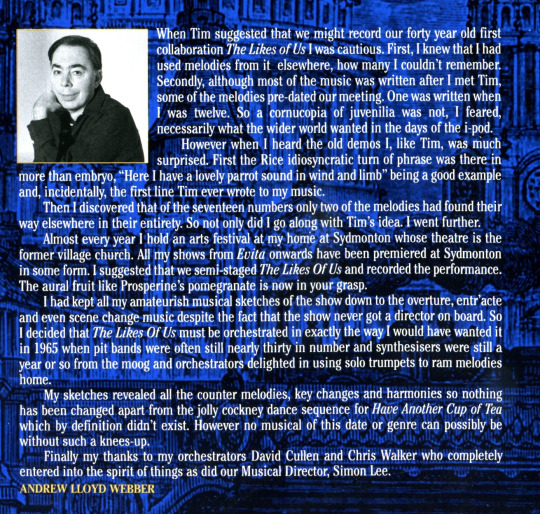
Anyway, the show was written in 1965, then had its "40th anniversary [performance] and yet world premiere" in 2005. ALW and Rice didn't really remember the plot and the book was constantly changing anyway, so the most brilliant possible choice was made: Stephen Fry was cast as a narrator.

He does an absolutely wonderful job, turning what would otherwise be a cloying story with passable melodies into a delightfully funny evening. Honestly, it's tempting to just make this post nothing but quotes of his narration, but I couldn't find a transcript and there are limits to how much I want to transcribe jokes when I'm trying to get you to listen to the album anyway.
Okay, just a few:
"It's told in song, dance, and spoken word as was the unbreakable fashion in musical theater at the time."
"Neither traumatic event, however, inspired a song from the two youthful authors, who one might well think these days be extremely aroused by the idea of an anti-lawyer number."
"'Will this last forever,' a simply ravishing melody but a rather risky title about three quarters of the way through any musical."
"There was here a scorchingly satirical song, I believe, making fun of poncy peers and fancy knights of the realm, but for some reason Lord Webber and Sir Tim Rice seem to have lost it."
youtube
Aside from the quips, my favorite of the actual songs is Going Going Gone, because I always love a good ensemble number listing stuff. (See also: "Under the Sea," "La Vie Boheme," "Murder, Murder," etc) (That, and the musical doesn't build up the romance enough to make the ballads affecting.)
youtube
Of contemporary interest, Hannah Waddingham played Rose, the cockney woman offended by Bernardo's attitude about her neighborhood. So if you want to hear her singing something a little, uh, different from what you usually hear from her, you can listen to "We'll Get Him" and "Have Another Cup of Tea." (This was a year before she was cast in the West End Spamalot.)
Anyway, you can find a few clips from local productions on Youtube, but the real joy is Stephen Fry so you may as well just listen to the soundtrack on Spotify or something. I particularly recommend it for when you have a boring task to do (data entry?) and need something to keep you entertained without working up your passions or giving you a new hyperfixation.
Last quote: "And this, ladies and gentlemen, is what failed to launch the careers of Andrew Loyd Webber and Tim Rice 40 years ago."
#shameless promotion#musical recommendation#the likes of us#andrew loyd webber#tim rice#alw#stephen fry#hannah waddingham#Youtube
9 notes
·
View notes
Text
Fairy Tale June:The Wonderful World of the Brothers Grimm
So today we are actually going with a big movie ,a George Pal extraviganza
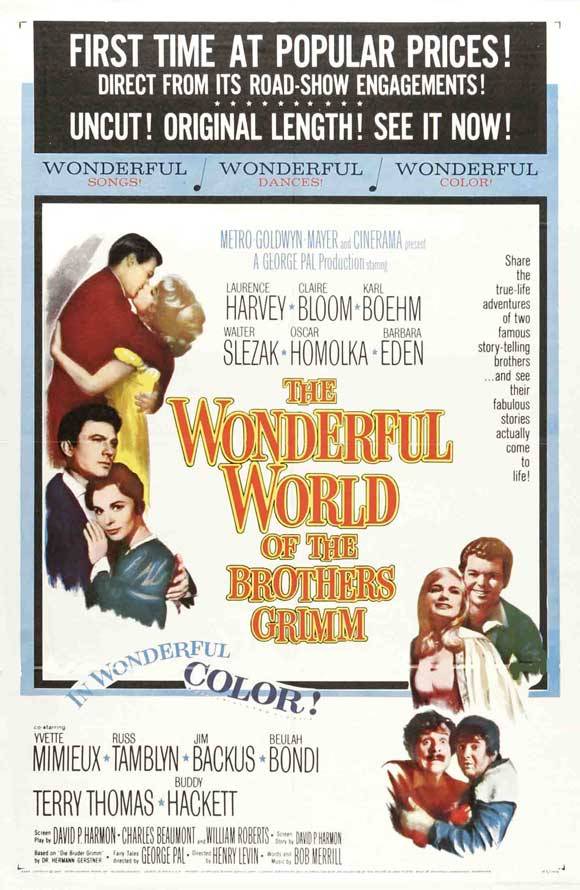
In this 1962 film we follow Willhem Grimm (Laurance Harvey), a fanciful dreamer,and Jacob Grimm (Karl Bohem ) a down to earth scholar ,as the pair is supposed to write down the family history of a Duke (Oscar Homolka) ,Willhelm gest distracted by fairy tales ,which he realizes no one has written down .....Thats the main story,what makes the film unique....is it also adapts three classic Grimms fairy tales :The dancing Princess follows a woodcutter (Russ Tamblyn) who uses an invisible cloak to discoverthe mystery to why a princess(Yvette Mimeux) always has destroyed shoes ,the Elves and the Shoemakers follows a old cobbler (Also played by Harvey ) who gains the help of some elves (voiced by Stan Freberg,Dallas Mikkinion and Thurl Ravinscroft ) and the Sining Bone where the cowardly and egotistical Sir Ludwig (Terry-Thomas ) tries to take credit for slaying a dragon that was actually slain by his servent Hans (Buddy Hackett )
SO this film is done by George PAl,producer of many Sci Fi and fantasy films ,probabbly best known for his HG Welles adaptations ,War of the Worlds and the Time Machine.In fact I kind of see this film as a spirtual follow up to his musical version of Tom Thumb ,which also had Russ Tmablyn and Terry-Thomas (In fact as well as playing the Woodsman,Tamblyn also plays Tom Thumb in a climatic sequence I will get to later ),and I think oversall,while I enjoy parts of Tom Thumb.....This film is better.HOWEVER it is still uneven to the point I didnt know if I liked or disliked it tillI was near the end,and even then.....I had to think about it
The movie is kind of two movies ,it is a bio pic about the Grimm Brothers AND a anthology of fairy tale ,and at first.....I was kind of wishing it was just the fairy tales ,and even then they arent immune to the big problem of the movie.....IT drags ,the pscing is very slow,I guess to make it 2 hours
We are gonna go by segments :
The main Grimm Brothers story on its own is dull ,it didnt feel substantial to me at first ,just Willhelm messing up and setting up the fact they will eventually write down the fairy tales ....HOwever what made it work was the performances ,LAurance Harvey was really lovable as the dreamer Willhelm,Karl Boehm is believable as the serious Jacob,and Oskar HOmolka is scene chewingly fun as the unpleasent Duke,with other good performances coming from MArtita Hunt ,Barbra Eden,Claire Bloom and Walter Slezak ....What also works is the ending which I will go into later
The Danicng Princess is fun ,showing some great physicality by Russ Tamblyn in both stunts and dancing.Now in the fairy tale its 12 Princesses but for this segment it makes sense to streamline it to one.The Highlight of this one is Jim Bakus as the murderous yet jovial King (Aided by him doing the Mr Magoo voice)
The Elves and the Shoemaker was my least favorite part of the film ,Harvey is good,but the segment was a lil dull and I willl be frank ,while I love stop motion and shall praise some later ....THE ELVES ARE FREAKY AND CREEPED ME OUT (However did notice one of them was the Yawning Man from Tom Thumb that was cute )
The Singing Bone is both the darkest and funniest tale and by far my favorite part of the film .Terry-Thomas was a comedic genius and here is perfectly cast as a villainous knight who lets his servent do all the heavy lifting .Buddy Hackett is also very fun as the unlikely hero ,I never knewI wanted to see Scuttle fight a dragon but I am glad it exists .The best part of the d scene IS the dragon,brought to life through some brillaint cartoony stop mostion,this beastie has a ton of personality,being very bored and hungry,focused on killling the two main characters ,and I love the design which is a mixture of eastern and western dragons with jewl encrusted scales
But the scene that sold me on the movie and why I reccomend the movie is Willhelms dream:Spoilers Willhelm gets very sick and in a fever dream sees Snow White and the seven dwarfs,a Giant,the Frog Prince,Tom Thumb, Rumplestiltskin,and other fairy tale characters ,who convince him to not only lived but write down their stories .Its a very sweet and emotional scene ,and I particularly like comedian Arnonald Stangs take on Rumplestiltskin as a bad tempered mean guy (I kind of wish he got his own segment ).
For all the flaws of the movie,I did enjoy it ,and if you can find it,I reccomend giving it a watch
@ariel-seagull-wings @angelixgutz @autistic-prince-cinderella @amalthea9 @scarletblumburtonofeastlondon @princesssarisa @filmcityworld1 @the-blue-fairie @theancientvaleofsoulmaking @themousefromfantasyland
6 notes
·
View notes